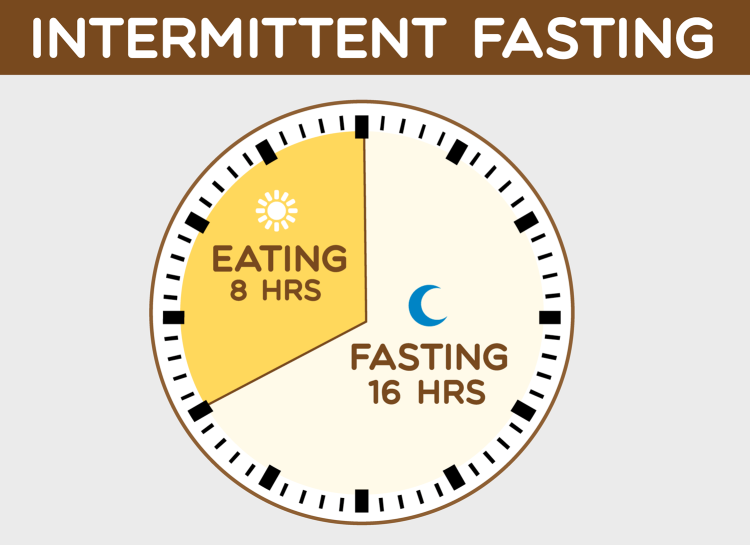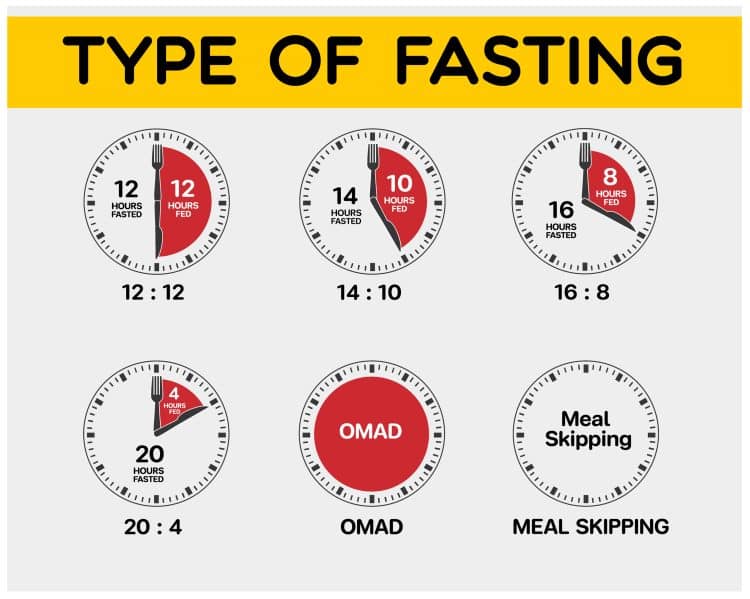How often should you fast depends on the type of fast you want to follow. If it’s a 16-hour fast, you can try to adhere to the regime daily. If you choose a 24-hour fast, you can follow it twice a week. If you aim for an extended 48-hour fast, the advisable frequency is twice a month.
Intermittent fasting (IF) is a global hit because of its myriad health benefits. Studies show intermittent fasting can help with weight loss, reduce inflammation, boost cognitive abilities, increase metabolism, improve heart health and insulin sensitivity, and even boost longevity. (1)
However, getting started with intermittent fasting can be confusing, particularly when choosing the right frequency. How do you know which frequency will reap you maximum benefits?
Calculate Your Autophagy Timeline
Find out exactly when your body enters autophagy based on your unique profile, diet, and fasting protocol.
Calculate My Autophagy Window →Is there a specific period of fasting required to maximize results?
As a health expert, I have been asked this question several times. Drawing from scientific research and personal experience, I am here to clarify this crucial aspect of intermittent fasting.
With this article, we delve into how often you should fast to achieve the maximum benefits. Although there are several methods, it is essential to understand how each works and all the factors determining what is best for you.
What is Fasting?
Voluntary fasting involves abstaining from calorie intake for a particular period. Intermittent fasting (IF) typically lasts 12 to 24 hours, sometimes longer. However, water, herbal tea, black coffee, or any kind of zero-caloric beverages are allowed during intermittent fasting.
During the last couple of years, intermittent fasting has gained remarkable popularity because of its various health benefits. There are several ways to perform IF. For example:
- Time-restricted Feeding (TRF): You may eat during a particular window during the day and fast for the remaining hours.
- Alternate day fasting (ADF): This involves fasting every alternate day; however, a maximum of 500 calories can be consumed on fasting days.
- The 5:2 method: It includes eating five days a week and fasting for any two non-consecutive days.
- One meal a day (OMAD): In this method, you might eat one meal a day, twice a week.
Things To Remember While Intermittent Fasting
Experts believe your habits play a significant role in achieving the benefits of intermittent fasting. For example, consuming calories during your fasting window, overeating during your feeding period, not sleeping enough, or not exercising could delay or impede intermittent fasting results.
Regardless of how strictly you follow a healthy diet and lifestyle, the benefits of intermittent fasting can manifest at varying times throughout your fasting schedule.
For example, you might experience weight loss during a brief fasting period. Yet, achieving ketosis or activating autophagy – key processes for eliminating waste, enhancing cognitive function, and boosting longevity – often necessitates a much longer fasting duration.
How Often Should You Fast? 3 Factors to Consider
There is no one-size-fits-all approach to how often one should fast. Several factors affect the fasting schedules, such as how long and often you should fast. Below are some crucial factors to consider when deciding how often you should fast:
1. Your Fasting Duration?
The primary aspect to consider when determining the frequency of your fasts is the length of each fasting period. Presumably, the longer your fasting periods are, the less your fasting frequency will be.
Scientific research indicates that intermittent fasting is safe (7). However, if you fast for 24 hours or more in each fasting period, you must reduce the fasting frequency to give your body time to recuperate.
2. Health Goals
People who follow intermittent fasting or long-term water fasting do so for several reasons, including weight loss, increased autophagy, improved growth hormone and insulin sensitivity, reduced inflammation, and better heart and brain health.
Although you can lose weight with a general time-restricted fasting approach, other benefits like improved metabolism and increased autophagy can be achieved only through long-term fasting protocols.
Additional considerations in setting the frequency of fasting for weight loss include your weight loss goals and whether they align well with your lifestyle.
If you’re fasting for 24 hours daily to lose weight, adhering to a low-calorie diet, and participating in intense physical exercise throughout the week, engaging in additional intermittent fasting might be redundant, as you’re already achieving weight loss through regular 24-hour fasts.
3. Your Current Health
If you are suffering from chronic or acute health problems, you’ll probably be advised to fast less often unless you’re overweight, diabetic, or have a medical condition like epilepsy where your doctor wants you to fast for your health or weight loss.
Benefits of Different Fasting Methods
The various health benefits of different fasting periods include:
1. Benefits of a 12-hour Fast
As per experts, a fast that lasts less than 12 hours doesn’t reap any fasting-associated benefits. Research shows that there can be a 36% greater risk of breast cancer relapse if a person fasts for less than 12 hours per day. (2)
When you fast for a shorter span, like a 12-hour fast, you may be less likely to be exposed to gut-related toxins such as endotoxin. Endotoxin is a by-product of bacterial death, which results in metabolic syndrome, obesity, and inflammatory diseases. (3)
While a 12-hour fast can aid in weight loss, extending your fasting period is necessary to reap other benefits, like entering ketosis or triggering autophagy.
2. Benefits of a 14 to 18 Hours Fast
A 14 to 18-hour fast per day can provide better weight loss benefits than a 12-hour fast. In this stage, the ketosis or fat-burning stage also takes place. (4)
Entering ketosis depends on a few factors, including what you consumed in your last meal. Ketosis usually occurs between 12 to 22 hours of fasting, when you exhaust your glycogen stores.
Although 14 to 18 hours is a good fasting window, if you want to experience more significant benefits like increased autophagy, you must switch to 24-hour fasts. Autophagy is a self-cleaning process in which your body cleanses the unnecessary dysfunctional cells and creates new, healthier cells. (5)
Autophagy helps reduce oxidative stress by combating free radicals responsible for inflammatory and chronic diseases.
3. Benefits of an Extended Fast
Fasting for 24 hours daily is impossible because food is essential for survival. Hence, if you want to experiment with these autophagy-inducing extended fasts, you must set them strategically.
Going 24 hours without consuming calories, repeated several times a month over an extended period, is highly effective in preventing chronic illnesses like coronary artery disease (CAD) and diabetes.
How Often Should You Fast? Analyzing Different Fasting Methods
Here are some fasting methods and their optimal frequencies:
How Often Can You Fast for 16 Hours?
According to most health professionals, intermittent fasting can be practiced almost daily. You can continue with this practice as long as you’re healthy and meet your daily macro and micronutrient requirements.
The 16:8 method is the most common intermittent fasting diet schedule. It involves fasting for 16 consecutive hours, followed by an 8-hour feeding window. For example, you may start fasting after dinner at 6 pm and only have your first meal at 10 am the following morning.
How Often Can You Fast for 24 Hours?
Performing a 24-hour fast once a week is considered safe for weight loss and health goals. People familiar with alternate-day fasting can do the 24-hour fasting several times a week. However, you should consult your doctor if you choose to follow this approach.
How Often Can You Fast for 48 Hours?
Most health experts agree that a 48-hour fast can be safely done twice a month. However, these two days of fasting must be separated by at least an entire week of normal eating.
How Often Can You Fast for Three Days?
Although a three-day fast has gained popularity, it is quite challenging mentally and physically. This type of fasting can be done once a month after consulting your doctor.
How Often Can You Fast for Five Days?
Fasting for five consecutive days can lead to acute consequences like an electrolyte imbalance. Hence, it must only be performed after consulting an experienced healthcare professional. This type of fasting may be tried once a quarter if and only if your doctor gives you the clearance. (6)
How Often Can You Fast for a Week?
A seven-day fast is an extreme fasting practice that should only be performed under a doctor’s supervision. This type of fasting should not be done more than twice a year.
Frequently Asked Questions
What is the recommended fasting frequency for beginners?
Beginners should start with an intermittent fasting routine that involves shorter fasting periods. For example, you can opt for a 16:8, 14:10, or 13-hour fasting plan in the beginning. You can extend the duration as you gain more experience.
Am I supposed to fast every day?
Fasting plans such as 12-hour, 14:10, 16:8, 18:6, and 20:4 can be practiced daily. However, fasting for extended periods, such as 24 or 36 hours, can be practiced after consulting a doctor. Although many intermittent fasting options are available, you must pick the one that suits your needs, preferences, and lifestyle.
How long should I fast daily?
If you wish to try intermittent fasting, there are various ways to perform it. The most popular methods usually range between 12 and 24 hours. However, it all depends on how experienced you are with fasting. You can start fasting by skipping just one meal and gradually increasing the duration.
Conclusion
So, how long should you fast for?
It is safe to fast daily. However, the longer your fasting duration, the less often you should do it. Moreover, depending on your health and objectives, you must consult a healthcare provider on how long and how often you should fast.
The best duration of fasting depends on the individual’s needs, current health, and preferences. The key factor to focus on is determining the fasting duration that best aligns with your needs.
References
Fitness Volt is committed to providing our readers with science-based information. We use only credible and peer-reviewed sources to support the information we share in our articles.
- Malinowski, B., Zalewska, K., Węsierska, A., Sokołowska, M. M., Socha, M. W., Liczner, G., Pawlak-Osińska, K., & Wiciński, M. (2019, March 20). Intermittent Fasting in Cardiovascular Disorders—An Overview. Nutrients.
- Anemoulis, M., Vlastos, A., Kachtsidis, V., & Karras, S. (2023, January 19). Intermittent Fasting in Breast Cancer: A Systematic Review and Critical Update of Available Studies. Nutrients.
- Mohammad, S., & Thiemermann, C. (2021, January 11). Role of Metabolic Endotoxemia in Systemic Inflammation and Potential Interventions. Frontiers in Immunology.
- Dhillon, K. K. (2023, February 6). Biochemistry, Ketogenesis. StatPearls – NCBI Bookshelf.
- G., Barth, S., & Macleod, K. F. (2010, April 1). Autophagy: cellular and molecular mechanisms. The Journal of Pathology.
- Jiang, Y., Xi, Y., Dong, C., Lu, Y., Yin, H., Xiao, B., Yang, X., Chen, W., Cheng, W., Tian, H., Guo, L., Hu, X., Fang, H., Chen, W., Li, Z., Zhou, W., Sun, W., Guo, X., Li, S., . . . Jia, L. (2021, July 29). Five‐day water‐only fasting decreased metabolic‐syndrome risk factors and increased anti‐aging biomarkers without toxicity in a clinical trial of normal‐weight individuals. Clinical and Translational Medicine.
- Varady KA, Cienfuegos S, Ezpeleta M, Gabel K. Cardiometabolic Benefits of Intermittent Fasting. Annu Rev Nutr. 2021 Oct 11;41:333-361. doi: 10.1146/annurev-nutr-052020-041327. PMID: 34633860
Tip: If you're signed in to Google, tap Follow.












